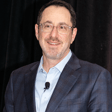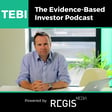Become a Creator today!Start creating today - Share your story with the world!
Start for free
00:00:00
00:00:01

Ep 18: Adam Laird on the rise of passive investing in Europe
We’ve all heard about the huge growth in popularity of low-cost investing in the United States. But how is the passive investing revolution progressing in Europe?
That’s one of the questions I put to Adam Laird, Head of ETF Strategy at Lyxor ETF for the the latest TEBI Podcast.
Lyxor is based in France but also has a sizeable market share in Germany, Italy and Spain. It’s now targeting growth in the UK.
Transcript
Introduction to Tebi Podcast
00:00:04
Speaker
Hello and welcome to the latest Tebi podcast brought to you by the evidence-based investor in conjunction with Regis Media, connecting advisors with clients. I'm Robin Powell. And our special guest today is Adam
Overview of Lixor ETFs
00:00:20
Speaker
Laird, who is head of ETF strategy at Lixor ETFs. Adam, thank you for joining us. Thank you. So for people who don't know who Lixor ETFs are, tell us all about you.
00:00:32
Speaker
Lixor is a European asset management. ETFs are our speciality. We've been managing ETFs for about 18 years now. We were the first European company to bring ETFs to market. And we've got a wide range, over 200 investments. And we focus, amongst other things, on some very low-cost investments. We focus on quality.
00:00:58
Speaker
So you started out as a hedge fund company or certainly a company that worked largely with hedge funds that thankfully things have evolved a little bit since then but maybe you could just give us a little bit of the background. Yeah so Lixor has two sides to it. The asset management division works with
00:01:18
Speaker
alternative investments. We have a team who does manage and run hedge funds but as well as that we've got the ETF division and we're really split between that. On one hand we've got more active strategies, we've got more alternative investments and on the other hand it's low cost simple passive ETFs that we're doing and that really
Lixor's Market Focus and Strategies
00:01:44
Speaker
I think in some ways reflects the way that investors are looking at their money more and more, that the core of their investments are being built on lower cost passive strategies and then for people who do need something that's very different, that's the alternative hedge fund side.
00:02:03
Speaker
So tell me, just to give a little snapshot of your kind of, of your ETF product range, how many products have you got and of those, how many are genuinely passive? From our ETF side, we've got around about 200 products out there at the moment, and that's managing roughly 60 to 70 billion euros overall. And of that, I would say about 90% of those are true
00:02:32
Speaker
passive investments concentrating on individual markets or global markets and then we have some as well alongside that which are more objective based investments and in these cases the the investments that we have will do it will be setting out to achieve investors aims such as reducing risk or looking for looking for dividends concentrating in income.
00:02:58
Speaker
So you're a French-owned company, you're part of Societe du Generale, and so presumably you're big in France, big in Germany, Italy as well, I understand.
00:03:09
Speaker
We are, we've got a big European business, France, Italy, Germany, Spain, but also in the UK.
Lixor's Tax and Reporting Status
00:03:17
Speaker
I think for us, one of the things that makes us unique is that we are European-focused, that we don't have US parents, that our business is concentrated around the needs of British and European investors.
00:03:30
Speaker
Now, as a company, you threw the cat among the pigeons, if you like, in the UK investing industry a few months ago now when you actually announced a very low cost range of ETFs. Tell me about that. So it's one of the things that investors have asked us for again and again. They want low costs. They want investments which are high quality and they want core portfolio building blocks.
00:03:56
Speaker
And for us in the ETF industry, we said, this is one thing that we can provide. So we have a range of 16 core ETFs. They are all physical. There's no stock lending. They are all based with costs under 0.12%, 12 basis points. And some of our funds, the lowest cost out there are the UK and the US equity funds, 0.04%.
00:04:26
Speaker
And there's also no stop lending allowed, is that right? And why is that so appealing, do you think, to customers? For these core investments, we said no stock lending, physical only. And that's really because we didn't feel that we need to add anything else to the funds. Quality, really, is what people are asking for. And they don't want anything additional getting in the way. So these prices, I mean, they are, I must say, pretty low. And you're not paying me to do that.
00:04:54
Speaker
To say that, I should hasten to add, and your, for example, your UK guilt fund is half the price of its rivals, for example. But there are complexities, aren't there? There are tax complexities. Tell me about those. There's only one fund where there's a tax complexity, and that is in the US.
00:05:14
Speaker
For any investor who invests in US companies, there is withholding tax taken off the dividends that's out there. And that applies whether you're investing directly as an individual or if you're investing in a fund in the UK or based overseas. So our fund is based in Luxembourg.
00:05:33
Speaker
and the Luxembourg funds have US dividends paid with a 30% withholding tax, which is the standard rate. I know that there are some other areas out there which currently have reductions in those rates, but this is a standard withholding tax that's paid for Luxembourg-based investments.
00:05:54
Speaker
Taxes, generally, of course, are a minefield, and the investing space is no different. But basically, you pay tax wherever you are in the world when you invest in stocks from another country. So what you're saying is an investor in a Luxembourg domiciled licksaw ETF will pay 30% of the dividend in tax.
00:06:19
Speaker
Whereas you would pay less if you were based in the UK to tell me about that. Yes, this is right. If you're buying a UK based fund, you may be paying a 15% rate of withholding tax as opposed to 30%.
00:06:34
Speaker
This is a question of balance overall. Tax is more important for some investors than for others. For us, the US isn't a very high dividend market, so actually the reduction in yield is present, but it's
00:06:50
Speaker
not the biggest source of returns for US shares. I think that overall it's a toss-up for you because, as I say, the management fees for our fund are the lowest that's out there in Europe, at no point, not 4%. This withholding tax is a question that different investors will need to ask whenever they're making their choices.
00:07:12
Speaker
Now, you did have another issue, didn't you, which I understand has since been resolved in that leaks or ETFs didn't have UK reporting fund status, but maybe you could update me on that.
00:07:26
Speaker
Yes, all of our funds now have a reporting status. And that means that for a UK investor, you'll be paying an equivalent rate of tax to you would be if you were holding on short funds.
Advisory Engagement and Marketing Challenges
00:07:39
Speaker
So now that is not an issue on any of our London listed products.
00:07:44
Speaker
Okay, so the evidence-based advice firms that I tend to deal with around the world, including here in the UK, either tend to use a combination of vanguard funds or dimensional funds. Sometimes they might use a few iShares funds, for example, but very few people tell me they actually use leaks or ETFs. So go on, why should advice firms consider using leaks or ETFs?
00:08:13
Speaker
Yes, to be honest, our name is not as well known in the UK, but actually across Europe, we are one of the biggest and best known ETF firms. We're a top three provider. In Europe, we manage a lot of money for a lot of different sorts of investors. And people come to us because of our specialties. They come to us for low-cost investments, particularly in UK equity, in gilts.
00:08:39
Speaker
They will come to us for our inflation protected investments. That's something that we're very strong in, helping investors manage rising prices in the long term portfolio. They'll come to us for European shares.
00:08:56
Speaker
because we've got one of the widest ranges of European equity. We have got certainly some specialties that we're very proud of and actually we talk to more and more people who are using our ETFs as part of their portfolio.
00:09:13
Speaker
So what are you doing to kind of get your message across to advisors? I mean, we're seeing quite a few launches now of kind of low-cost investment propositions for advisors. Vitality Invest, for example, launched a range here in Birmingham that I went to a couple of weeks ago. What are you doing to get the message across?
00:09:42
Speaker
Well, for us, I think that we are out there knocking on doors and talking to a lot of different advisors about our investments and about what we can do, how we can help. I think that, yes, there are a lot of companies out there who have got low fee options. We are one of the lowest costs that's out there. I think that one of the other things that we've done traditionally,
00:10:05
Speaker
We've always made sure we put out a lot of information, a lot of research, a lot really that helps advisors when talking to their clients understand what it is they're buying, why they should be using it, how it makes part of their overall investment proposition.
00:10:23
Speaker
People who read the evidence-based investor will know it's a constant cause of consternation to me that so many advisers, UK-based advisers, still continue to recommend actively managed investment products.
00:10:39
Speaker
In your view, why is that the case when there is this mountain of evidence that most investors are better off simply trying to capture market returns at as low a cost as possible? I think part of it is simply the history that we didn't always have such a good range of low cost products out there, but actually that's definitely not the case anymore. It's really easy to get simple low cost investments.
00:11:08
Speaker
I think part of the appeal of the active manager has been that the strategies have been targeted at very specific needs, like dividends, for example, but actually that's no longer the case as well. For the last 10, 12 years you've been able to buy low-cost, passive dividend-focused funds, which really replaces part of the job of the active manager.
00:11:33
Speaker
But I think that possibly investors haven't asked the question enough, what is this manager doing for me? And if you now know that the fund that you have really isn't going to be able to live up to its promises, it isn't going to have the returns that perhaps once did, it's not going to be able to fulfill your ambitions, then yes, that's when you should be looking at the evidence and making that change.
00:11:56
Speaker
Isn't one of the reasons for the preponderance of active management here in the UK, though? Simply that the active managers are so good at marketing, you know, and do have big marketing budgets. They hold these big events. I've been to them myself. I've been chucked out of one myself. Events for financial advisors. You've got to be doing the same, haven't you, as well. I mean, smaller companies like Lixor.
00:12:25
Speaker
And then, indeed, Vanguard and Dimensional have to be getting out there, and if you excuse the expressions, you're selling yourself to advisors.
00:12:34
Speaker
You're right and we are trying to do a lot of work with that to get out and to make ourselves known, to put our research out there. I think you've raised a great point that for a long time it was very appealing to see a big name manager, a big face who could go and sell their proposition, who could go and talk their own book.
00:12:57
Speaker
But one of the things that we've seen, the UK specifically, over the last five years is having a star manager is a real risk.
00:13:07
Speaker
The number of big name managers who have retired or left to start up their own business or have suffered bad periods of performance and ended up in some sticky situations because of their striving for returns, that is a concern. And investors really need to be questioning, well, why am I going with a big name out there when I could be going with something that
Trends in Investor Behavior
00:13:33
Speaker
I know will persist in the next 20 years' time.
00:13:38
Speaker
What do you make, for example, of someone like Neil Woodford who went through a long period of underperformance and then did quite considerably outperform the index even after costs over a long period? He was very heavily marketed when he set up his new operation on his own, Woodford Funds, and it was very heavily marketed as well by your former employers at Hargreaves, Lansdown, for example.
00:14:04
Speaker
And now he reappears to have come unstuck. I mean, what do you make of what's happened there? Well, I think that the question is, when you look at names such as Woodford, there are some managers who have shown long-term periods of good track record of outperformance. I think there are some managers who have had short periods of outperformance and then who have dropped off, who have fallen off that cliff somewhat.
00:14:31
Speaker
And I think that that's the problem. It's consistency, and that's really where there's a danger for investors. If you're buying something that is not able to last over the long term, then you have a danger that you're maybe buying in at the wrong time. And I'll go back to my previous point. If you have someone who has been outperforming consistently over a 20-year period,
00:14:56
Speaker
Does that tell you that they're going to carry on for another 20 years? Or does that mean they're going to retire soon? I'd reckon they probably got their money and they're probably thinking about the beach. Absolutely, absolutely. So I was going to ask you as well about some research that you did recently about investor behaviour. And thankfully now, investor behaviour is being given the kind of prominence that it deserves because I'm sure you'd agree it's a hugely important area.
00:15:22
Speaker
And you did some research, didn't you, into behaviour during and after that kind of wobble, stock market wobble that we had back in February now? As an ETF provider, one of the things that is on the forefront of our mind is money flow. If people are buying what they are buying at what period and how that matters for the overall industry.
00:15:49
Speaker
And one of the questions that we had in February was, when the US market predominantly took a turn, corrected, would investors pull out on mass? Would ETFs be the catalyst for a mass pullback? And could that spread some contagion?
00:16:07
Speaker
And categorically, the data showed no. Throughout that period, investors kept topping up their ETF holdings. So even when the market was falling, there was still money going into ETFs within Europe. And that for me told me,
00:16:25
Speaker
that actually the ETF wrapper, the passive investors, are using the market correction as a time to go and top up, as a time to try and take advantage of a bargain. And that's a real positive sign. It is. Of course, at that same time we heard that the computer systems in America at well-front and betterment are too big.
00:16:50
Speaker
robo-advisors over there sort of crashed with all the people trying to get out of their investments. But I take your point. Here in the UK, at least, and particularly amongst leaks or customers, you probably saw better behaviour than most of the kind of pundits, if you like, were predicting. There's no doubt. Whenever a market falls,
00:17:15
Speaker
If you are watching it, you will be concerned. This is your money, that is natural. It's about managing that behavior though. And I think the best investors are the ones who are aware of the pool that they're likely to feel and will react to it in a positive way.
00:17:30
Speaker
because it's very easy to think I'm panicking, markets are turning south, I may be losing my money, but actually, as an investor, it is on you to say, right, let me take a step back and let's see how the land lies in a couple of days, once the dust has settled.
Industry Shifts Towards Low-Cost Options
00:17:50
Speaker
Things never look that bad a week down the line.
00:17:55
Speaker
The investing industry is changing rapidly around the world. And it's for a number of reasons. I mean, the main reason is the kind of pressure on fees and so on. But how do you see it changing? And not just the investing industry, but the financial advice profession. How do you see it changing over the next 10 years or so?
00:18:16
Speaker
I think that actually there's been a lot of pressure already on advisors just to make sure that what they are doing is right for the earned investor, that they are recommending the right investments, that they are doing the right build up. I think that there was a small but unfortunate group who perhaps had been dominated by commissions in the past. But actually, there's a lot of good that the right advice can do for an individual.
00:18:44
Speaker
Things like setting up trusts, looking at your tax affairs, helping manage your spending, doing planning for retirement, looking at the insurance offering that's out there. All of these are really important parts of the advice process. In some ways, with the rise of evidence-based investing, it's easier than ever for an individual to buy a portfolio.
00:19:10
Speaker
which covers a broad range of assets at a really low cost. That is only one part of the advice that's required out there. The broader infrastructure, and by matching that to you and your individual objectives, that's really where an advisor can add something.
00:19:29
Speaker
And as you know, Adam, we're behind the curve in terms of what's happening and what's been happening over the last sort of 10, 15 years in the investing industry and the vice profession in the United States. The UK probably kind of ahead of the pack, rest of the pack in Europe, would you say? I mean, are other countries that you work in, are they playing catch up a little bit? I mean, I'm thinking, for example,
00:19:55
Speaker
of France and Germany where traditionally there are big banks and insurance companies have been very strong. So yes, on the continent in France, Germany, Italy, the investment landscape is quite different because it is more dominated by banks and insurance companies. I think actually one of the ways that we are ahead in the UK is with the RDR.
00:20:19
Speaker
RDR banned commissions from investment funds going back to the platform or to the advisor. And that meant that there was a level playing field created by different sorts of investments.
00:20:36
Speaker
no longer could someone buy their way into a portfolio. And as a result, the use of low-cost passive strategies has gone up and up. And actually, that's happening in the rest of Europe now. People are scrutinising the investment choices that are being made, and it is pushing more people towards simple low-cost options.
Lixor's Future Goals
00:20:59
Speaker
One final question. Where do you hope to see Lixor in the next sort of five or ten years?
00:21:05
Speaker
Oh, we're certainly targeting to be the biggest or at least the second biggest of the ETF providers out there. And we know that we've got a quality range, we've got innovation, and we've got low cost products. So for us, I think it's really positive.
00:21:22
Speaker
Adam, well, thank you very much for joining us. I must say it's great. Someone actually coming out from London to the sticks here in Berlin to come and speak to us makes it far much easier for me.
Podcast Conclusion
00:21:34
Speaker
So thank you very much indeed for your time and all the best with your work at Licksaw ETF. So that's it for this episode. You've been listening to...
00:21:45
Speaker
Adam Laird, Head of ETF Strategy at Lixor ETFs. And if people want to find out about Lixor ETFs, you've got a UK website. lixoretf.co.uk Thank you. And presumably you've got separate sites for different... We haven't, that's right. Lovely. Thank you as well to our sponsor Regis Media. And if you're a financial advisor and you want to find out about Regis Media and how it can help you to attract, retain
00:22:13
Speaker
and educate clients, then visit the website regismedia.com. And finally, a request. If you've enjoyed listening to this podcast with Adam Laird, please subscribe to it on iTunes or on SoundCloud.
00:22:29
Speaker
And if you really want to help us, why not write a review on iTunes? It'll only take a few moments and you really will be helping us to educate the end investor. Until next time, from Adam Laird and from me, Robin Powell, and our producer, Oida Rahman, goodbye.
















